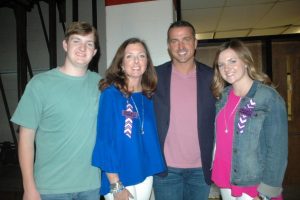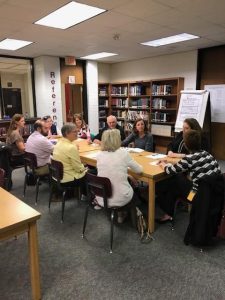Godwin organization works to combat drug abuse within schools

l to r- Harrison Derr, Jenny Derr, Chris Herren, and Jordan Derr at the Chris Herren drug awareness assembly in 2016. Jenny Derr spoke about her late son Billy.
Today, addiction touches the lives of many, even the Godwin community. The desire for change led to the creation of Project Purple
Project Purple is a substance abuse and mental health awareness organization created at Godwin in 2016. It was partially inspired by former NBA basketball player Chris Herren’s Project Purple.
The project materialized when a group of parents and administrators concerned about the community’s issues with substance abuse attended an assembly at Godwin about the topic.
After the assembly, most of the parents including Jenny Derr, a current volunteer and committee member for Project Purple, were not satisfied with the assembly’s content.
“The presenter, while well intended, missed the mark on so many levels. She spoke a lot about heroin use, but spent no time talking about what drugs lead to heroin, as it doesn’t start there,” said Derr.
Derr then contacted and met with former Godwin Principal Beth Smith to talk about resources for parents whose children are facing substance abuse issues. Also around that time, Derr and other parents continued to meet as they prepared for Chris Herren, a retired NBA player, addict and now motivational speaker, to come and talk to the Godwin community. Derr believes these events started the group’s momentum.
On April 25, 2016, Herren traveled to Godwin to give his story and describe his experiences with substance abuse. Herren’s life was taken over by drugs as he drank and smoked marijuana at the beginning of high school, leading to cocaine and other drugs.
After the Herren event and the leave of Principal Smith, Godwin Principal Leigh Dunavant continued the effort, leading to the expansion of the group and the renaming to Project Purple after Chris Herren’s project.
“I believe it is important for us to address the issues of substance abuse and mental health through prevention, intervention, and recovery efforts,” said Dunavant.
This school year, Project Purple has reached new levels of impact, such as the continual use of the WellNest, a trailer converted into a comfortable space for yoga and open counselor meetings, as well as having speakers talk at lunches.
Project Purple also participated in Red Ribbon Week, where Derr and Anne Moss Rogers, an addiction, suicide, and mental illness speaker, talked about their sons’ issues with substance abuse during lunch.
In the future, Project Purple plans to have more guest speakers share their messages with students. On May 2, Tom Bannard will speak to seniors about substance abuse prevention at the collegiate level. He is part of Rams in Recovery, an organization at VCU dedicated to promoting recovery from addiction.
Dedicated volunteers have been key components to Project Purple’s success. Derr’s experiences have benefitted the project as it builds momentum.
Derr’s son, Billy Derr, attended Godwin from 2007 to 2010. During his senior year, the family discovered his drug problem.
“We were so caught off guard,” said Derr. “We knew he had been drinking and smoking weed, but we had no clue about Xanax or pain pills. That began our journey, along with his, in battling his substance abuse disorder.”
After high school, Billy continued to struggle with addiction, seeing counselors, and eventually entered a full-time treatment facility in 2014.
Billy then relapsed after a year and a half of sobriety in 2016, but seemed to be back on the right track. Derr, however, died of a heroin overdose in April 2016, succumbing to his addiction.
Derr still struggles to cope with the pain of losing her son.
“To lose a child…I still can’t say that and not cry. The pain is indescribable. It is always with you,” said Derr.
Derr believes Billy’s substance abuse resulted from a combination of factors. The addiction disorder could have been caused by a severe car accident triggering his brain when he was young, his experimentation with alcohol and marijuana, a narcotic prescription as a kid, or how he was given a Vicodin by someone after they had their wisdom teeth removed.

A Project Purple meeting on April 23. School leaders met to speak about substance abuse at Godwin.
“We had no clue what addiction was or how taking these pills just one time could have triggered the disease,” said Derr.
Derr continues to emphasize the fact that her son was more than just an addict. Despite the negative label of “addict,” Derr describes Billy as a family-oriented man who loved sports and popular rap culture.
Derr decided the only way to make change was for their family to start raising awareness and sharing Billy’s story.
“I remember calling Billy and clearing it with him. He was super supportive. I think he would be really proud of me and proud of how we have advocated for so many,” said Derr.
In regards to Project Purple, Derr is pleased with its progress so far.
“I’d say I am most proud of the willingness of the staff, led by Mrs. Dunavant. She truly has led with compassion and an open mind and heart,” said Derr.
Throughout her physical and emotional journey, Derr now has goals for Project Purple and substance abuse awareness in general.
Derr is pushing for increased control of prescription medication in the home, challenging unnecessary prescriptions from doctors, and raising awareness to the fact that addiction is a brain disease, not a moral choice.
“I hope people will also learn that if they know or love someone who suffers from addiction, they are not alone, there are resources,” said Derr.

